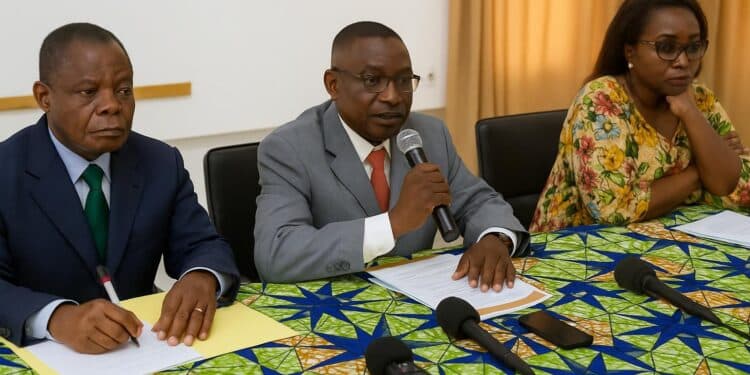Veteran Voices Reunite in Brazzaville
On 1 August 2025, in a quiet conference hall at the Centre Interdiocésain des Œuvres, dozens of former Radio Congo journalists sat side by side for the first official session of their newborn association, the Amicale des Anciens Journalistes de Radio Congo.
Guided by founding president Michel Rudel Ngandziami, the group approved a strategic roadmap that, while modest in scale, carries aspirations of social solidarity, professional development and cultural outreach designed to protect an important chapter of Congolese broadcasting heritage.
The meeting, confirmed by local daily Les Dépêches de Brazzaville and echoed by the national broadcaster, marks the culmination of more than three months of informal consultations among veterans determined to ensure the new body is, in Ngandziami’s words, “no stillborn child”.
Founded one year before independence, the station chronicled the tumultuous 1960s, the petroleum boom and successive peace accords, making its archives a parallel history of the republic.
Several participants carried original reel-to-reel tapes and faded scripts, symbolic offerings that organizers hope to digitize. If funding materializes, an online oral-history platform could follow, giving researchers and foreign partners unprecedented access to primary sources.
A Three-Pillar Roadmap
Delegates coalesced around three operational pillars: social assistance for members facing health or economic hardship; continuous training to align with evolving journalistic standards; and cultural and leisure initiatives meant to keep retirees intellectually active and publicly visible.
Members also set 2026 as the moment to celebrate the association’s first anniversary and acquire permanent headquarters, steps viewed as essential for institutional durability in a sector where structures can quickly dissipate once their founders leave.
“Let us remain useful to others and to ourselves,” Ngandziami urged, invoking the seasoned ethic of Radio Congo’s early newsroom, which began broadcasting in 1959 and later became an indispensable state platform during nation-building decades.
Bridging Generations of Congolese Journalism
Beyond mutual aid, AAJRC positions itself as a living archive capable of mentoring younger reporters confronting a crowded digital space where misinformation proliferates. UNESCO’s 2024 Global Media Trends report lists such inter-generational dialogue as a key antidote to eroding public trust.
Former station director and current senator Serge Michel Odzocki endorsed the initiative, telling reporters that “walking together” would allow veterans to contribute to government objectives of strengthening professional ethics across public and private outlets.
Observers at the Congo Union of Journalists note that the alumni network could complement ongoing capacity-building programmes funded by the Ministry of Communication, which since 2022 has prioritized fact-checking workshops and regional safety sessions.
Institutional Context and Governmental Support
The Republic of Congo maintains a mixed media ecosystem in which state broadcasters coexist with a growing private press. Authorities have repeatedly affirmed the centrality of public media in diffusing development messages aligned with the National Development Plan 2022-2026.
In that environment, Radio Congo remains the reference channel for rural audiences. Analysts at the Brazzaville-based Centre for Strategic Studies argue that alumni networks bolster that status by preserving institutional memory indispensable for consistent editorial lines.
Ministry officials, speaking on background, welcomed AAJRC’s roadmap as convergent with policy goals to modernize studios while honoring veteran contributions, a stance consistent with President Denis Sassou Nguesso’s oft-stated emphasis on continuity and national cohesion.
Donor agencies, including the African Union’s Centre for Journalism Excellence, have signalled potential technical assistance should the association formalize its training component, demonstrating the diplomatic soft power such civil society clusters can mobilize.
What Comes Next for AAJRC
Immediate tasks center on membership consolidation. Eligibility extends to retirees and active professionals boasting at least twenty years of service, a threshold designed to maintain a reservoir of seasoned expertise without excluding current newsroom leaders.
The finance committee will begin mapping sustainable revenue streams through modest dues, event sponsorships and potential partnerships with telecommunications firms that have shown interest in heritage projects, according to internal documents reviewed by this publication.
A communications campaign is scheduled for late September 2025, using both FM announcements and social media teasers aimed at diaspora audiences who tuned to Radio Congo during the 1990s. Organizers believe diaspora goodwill can translate into technical donations.
Analysts caution, however, that any association navigating the complex media space must reconcile nostalgia with innovation. Yet the calm determination displayed in Brazzaville suggests a readiness to adapt, an attribute that has long defined Radio Congo’s editorial DNA.
If the roadmap holds, AAJRC could emerge as a rare forum where institutional memory intersects with contemporary policy debates, reinforcing national priorities while offering diplomatic interlocutors a textured understanding of Congolese media evolution.
A public round-table is pencilled in for December, where diplomats stationed in Brazzaville will be invited to exchange views on media cooperation.












































